- Home
- Karen Marie Moning
The Dark Highlander Page 19
The Dark Highlander Read online
Page 19
“Had you wished to cede me privacy, you would have steered yourself right back into the castle, old man.”
“Aye,” the man snapped right back, “so you could off and disappear again? I think not. I lost you once. I’ll no’ be losing you again.”
With that, the elderly man turned around to face them and Chloe’s eyes widened in astonishment. She’d seen him somewhere before! But where?
Oh, no. As quickly as it occurred to her, she denied it, shaking her head. Earlier in the day, in the portrait gallery at Maggie MacKeltar’s castle. She’d seen several portraits of him displayed in a section where half a dozen other paintings around them had been removed, leaving great dark spots on the wall. That was part of what had drawn her eye to them. Maggie had told her that the others from that particular century—the fifteen hundreds—had been taken down and sent out to be restored.
This man’s face had lingered in her mind because she’d been captivated by his uncanny resemblance to Einstein. With his snowy hair, rich brown eyes feathered by fine lines, and deep grooves bracketing his mouth, the man looked unnervingly like the great theoretical physicist. Albeit with a slightly wizardish cast. Even Gwen had agreed with a sunny smile when Chloe had remarked upon it.
“Wh-who is th-that?” Chloe stammered to Dageus.
When Dageus didn’t reply, the elderly man raked both hands through tufts of white hair and scowled. “I’m his da, m’dear. Silvan. ’Tis thinking, I am, that he told you no more than Drustan told Gwen afore he brought her here. Is that so? Or did you even tell her that much?” He shot an accusing glance at Dageus.
Dageus was as still as stone beside her. Chloe looked up at him, but he wouldn’t look at her.
“You said your father was dead,” she said uneasily.
“I am,” Silvan agreed, “in the twenty-first century. But not in the sixteenth century, m’dear.”
“Huh?” Chloe blinked.
“Rather odd when one ponders it,” he allowed with a pensive expression. “As if I’m immortal in my own slice of time. Gives a thinking man the shivers.”
“The s-sixteenth c-century?” She tugged on Dageus’s sleeve in a plea for him to jump right in and clear things up anytime now. He didn’t.
“Aye, m’dear,” Silvan replied.
“As in, you mean that since I’m seeing you—which means either you’re alive or I’m dreaming or I’ve lost my mind—that if I’m not dreaming and haven’t lost my mind, I must be, er . . . where it is that you aren’t dead?” Chloe asked gingerly, making certain she didn’t spell it out too clearly because then she’d have to entertain it as a valid thought.
“A brilliant deduction, m’dear,” Silvan said approvingly. “Though a bit roundabout. Still, you’ve the look of a clever lass about you.”
“Oh, no,” Chloe said firmly, shaking her head. “This isn’t happening. I’m not in the sixteenth century. That’s not possible.” She looked up at Dageus again, but he was still refusing to look at her.
Disjointed bits of conversation flashed through her mind: talk of portals and ancient curses and mythical races.
Chloe stared at Dageus’s chiseled profile, sorting through facts that were suddenly imbued with a terrible significance: He knew more languages than anyone she’d ever met, languages long dead; he had artifacts in mint condition; he was searching books that centered on the history of ancient Ireland and Scotland. He’d stood her in the center of a circle of ancient stones and asked to her to go somewhere with him that he couldn’t tell her about, but had to show her, as if only seeing was believing. And in that circle of stones a powerful storm had risen and she’d felt as if she were being torn apart. There’d been a sudden climate change, the scenery currently included full-grown, century-old trees that hadn’t been there before, and there was an elderly man claiming to be his father—in the sixteenth century.
And while they were on that topic—if any part of her current circumstances was actually real—what was his father doing in the sixteenth century, for heaven’s sake? She latched onto that lovely little bit of blatant illogic as proof that she must be dreaming.
Unless . . .
What if I told you, lass, that I’m a Druid from long past?
“What?” she snapped, glaring up at him. “Am I supposed to believe that you’re from the sixteenth century too?”
He finally looked at her then, and said stiffly, “I was born in fourteen hundred and eighty-two, Chloe.”
She jerked as if he’d struck her. Then she started laughing, and even she heard the note of hysteria in her voice. “Right,” she said gaily. “And I’m the Tooth Fairy.”
“You know you felt something about me,” he pressed ruthlessly. “I know you did. I could see it in the way you watched me sometimes.”
God, she had. Repeatedly. Felt that he was strangely anachronistic, felt a bizarre sense of ancientness.
“You’re strong, Chloe-lass. You can accept this. I know you can. I’ll help you. I can explain it to you, and you’ll see that ’tis no’ . . . magic, but a sort of physics modern men doona—”
“Oh, no,” she cut him off, shaking her head vehemently. A hiccup terminated her laughter abruptly. “It’s impossible,” she insisted, rejecting it all in one grand unilateral sweep. “This is all impossible.” Hiccup. “I’m dreaming, or . . . something. I don’t know what, but I’m not going to”—hiccup—“think about it anymore. So don’t even bother trying to convince—”
She broke off, suddenly too light-headed to continue. The trauma of the storm, the absurdity of the conversation was all too much. Her knees felt as if they might buckle beneath her. Really, she thought dimly, there was only so much a girl could be expected to handle, and time-travelling Druids just weren’t part of it. More of that helpless laughter bubbled inside her.
As if from a far distance, she heard Silvan say gruffly, “’Tis good to be seeing you again, lad. Nellie and I have been sore fashed o’er you. Och, the wee lass is going, son. You might catch her now.”
When Dageus’s strong arms slipped around her, Chloe tuned out the voices and embraced the mercy of oblivion, because she just knew that when she woke up again, everything would be all right. She’d be in bed, in Gwen and Drustan’s castle, having had one of those strangely intense dreams about Dageus.
I like the sex dreams better was her final peevish thought, as her knees gave way and her mind went blank.
Adam Black was dozing—not sleeping, for the Tuatha Dé Danaan did not sleep—but drifting in memory and time when the nine members of the council appeared behind his queen’s dais.
He sat up abruptly.
One of them spoke into the queen’s ear. She nodded and dismissed them back to wherever it was the elusive council made their home.
Then Aoibheal, queen of the Tuatha Dé Danaan, raised her hands to the sky and said, “The council has spoken. It shall be trial by blood.”
Adam tensed to rise, but caught himself, and forced himself to sink back down on his cushioned chaise. He waited, measuring the reactions of the others gathered in the forest bower on the isle of Morar where the queen was wont to hold her court. Drowsing beneath silken canopies, the others stirred languidly, their melodic voices humming softly.
He heard no protests. Fools, he thought, it’s a wonder we’ve survived this long. Though immortal, they could be destroyed.
When Adam spoke, his voice was dispassionate, bordering on bored, as befitted his kind. “My queen, I would speak, if you will it.”
Aoibheal glanced his way. There was a glimmer of appreciation in her gaze as it raked over him. He wore her favored glamour—that of a tall, dark-haired smith, rippling with muscle. An otherworldly beautiful man who was wont to waylay human travelers, particularly women. A smith who took them to places and did things to them they later recalled as dark dreams of unending pleasure.
“You have my ear.” She inclined her head regally.
And on rare occasions, Adam thought, other parts of her when she so grac
ed him. Aoibheal had a certain fondness for him, and he was counting on it now. He was unlike any other of their race in small ways that baffled both he and them. But the queen seemed to enjoy those differences. Of all her subjects, Adam suspected he was the only one who still managed to surprise her. And surprise was nectar of the gods to those who lived forever, to those who’d lost wonder and awe an eternity ago. To those who spied on mortal’s dreams because they possessed no dreams of their own.
“My queen,” he said, sinking to one knee before her, “I know the Keltar broke his oath. But if one examines these Keltar, one finds that they have, for thousands of years, comported themselves in exemplary fashion.”
The queen regarded him a long cool moment, then shrugged a delicate shoulder. “So?”
“Consider the man’s brother, my queen. When Drustan was enchanted by a seer and forced to slumber for five centuries, the Keltar line was destroyed. When he was awakened in the twenty-first century by a woman, he went to extraordinary lengths to return to his time and prevent the catastrophe from happening so their line would remain intact, always protecting the lore.”
“I am aware of that. Unfortunate his brother wasn’t more like him.”
“I believe he is. Dageus broke his oath solely to save Drustan’s life.”
“That’s personal motive. The line was not threatened. They were expressly forbidden to use the stones for personal gain.”
“How was it personal gain?” Adam countered. “What did Dageus gain by so doing? Though he saved Drustan’s life, Drustan continued to slumber. He didn’t get his brother back. He didn’t get anything.”
“Then more fool he.”
“He is as honorable as his brother. There’s no evil in what he did.”
“The question is not if he is evil, it’s if he broke his oath, and he did. The terms of The Compact were clearly defined.”
Adam drew a careful breath. “We are the ones who gave them the power to travel through time. If we hadn’t, the temptation would never have existed.”
“Ah, now it’s our fault?”
“I’m merely saying that he didn’t use the stones to gain wealth or political power. He did it for love.”
“You sound like a human.”
It was the lowest insult among his kind.
Adam remained wisely silent. He’d had his proverbial wings clipped before by his queen.
“Regardless of why he did it, Adam, he now harbors our ancient enemy within him.”
“But he still isn’t dark, my queen. It’s been many mortal months since they took him. How many mortals do you know that could withstand those thirteen Druids by will alone? You knew them well. You know their power. Yet you would subject him to the trial by blood the council has called for? You would kill every person this man cares for to test him? If you destroy his entire line for this, who then will renegotiate The Compact?”
“Perhaps we shall live without it,” she said lightly, but he saw the merest hint of unease in her lovely, inhuman eyes.
“You would risk that? Our worlds colliding? Shall human and Tuatha Dé Danaan live together again? The Keltar have broken their oath, but we have not yet violated our end of it. The moment we do, The Compact will be void and the walls between our realms will crumble. Trial by blood will force us to share the earth, my queen. Is that what you want?”
“He’s right,” her consort stirred himself to speak. “Did the council consider that?”
If Adam knew the council half as well as he thought he did, yes. There were those on the high council who missed the old ways. Those who thrived on chaos and petty machinations. Fortunately, they did not include his queen. With the exception of whimsical entertainment, she disdained humans and had little desire to see them walking in her world again.
Silence shrouded the court.
Aoibheal templed slender fingers and rested her dainty chin upon them. “Interest me. Are you suggesting an alternative?”
“An order of Druids in Britain, descendants of those you scattered millennia past, has been awaiting the return of the Draghar; they have plans to force the Keltar’s transformation. If they succeed, do what you wish with him. Let that be his test.”
“Are you presenting a formal plea for his life, Amadan?” Aoibheal purred, her iridescent gaze shimmering with sudden intensity.
She’d spoken part of his true name. A subtle warning. Adam stared off into the distance for time uncounted. Dageus MacKeltar meant nothing to him. Yet he had a relentless fascination with mortals, indeed, spent most of his time among them in some form, to some degree. Yes, his race had power, but mortals had another kind of power, an entirely unpredictable one: Love. And once, long ago—almost unheard of among his kind—with a mortal woman, he’d felt it.
Had sired a half-mortal son.
Though he’d long endeavored to, he’d not forgotten those brief years with Morganna. Morganna who’d refused his offer of immortality.
He glanced at his queen. She would exact a price should he lodge a formal plea for a mortal’s life.
It would be a heinous price.
Then again, he thought, with a shrug of immortal ennui, eternity had been placid of late. “Yes, my queen,” he said, tossing his hair back and smiling coolly when the court gasped collectively. “I am.”
The queen’s smile was as terrifying as it was beautiful. “I shall name your price when the Keltar’s test has been met.”
“And I shall bide your law, given this boon: Should the Keltar best the sect of the Draghar, the thirteen will be reclaimed and destroyed.”
“You would barter with me?” A faint note of incredulity laced her voice.
“I barter for the peace of both our races. Lay them to rest. Four thousand years was long enough.”
What could only be called a very human smirk crossed the queen’s delicate features. “They wanted immortality. I merely gave it to them.” She cocked her head. “Shall we wager upon the outcome?”
“Yes, I wager he’ll lose,” Adam said rapid-fire. There it was, what he’d been waiting for. The queen was the most powerful creature of their race.
And hated to lose. Though she would not raise a hand to help him, at least now, she would not raise her hand to harm him.
“Oh, you’ll pay, Amadan. For that, you’ll pay dearly.”
Of that, he had no doubt.
17
“Stop peering at me like that,” Dageus hissed.
“What?” Silvan bristled. “I’m not allowed to look at my own son?”
“You’re looking at me as if you’re expecting me to sprout wings, a forked tail, and cloven hooves.” No matter that he was feeling as if he might. Since the moment he’d come through the stones, since the moment the thirteen had found their voices, he’d known that the battle betwixt them had moved into a new and much more dangerous arena. The ancients within him had been fed pure power when he’d opened the bridge through time.
With an immense effort of will, he shuttered, closed, tightened himself and projected pretense that all was well and fine. Using magic to conceal his darkness was an egregious error and he knew it, feeding precisely that which he endeavored to hide, but he had to do it. He dare not let Silvan see him clearly at the moment. He needed to search the Keltar library and if Silvan felt him now, God only knew what he’d do. Certainly not wave him into the inner sanctum of Keltar lore.
Silvan looked startled. “Is shape-shifting one of their arts?” he inquired, evincing utter fascination.
Typical Silvan, Dageus thought darkly, curiosity exceeding caution. He’d worried a time or two that Silvan might one day be tempted to dabble in black arts himself, out of naught more than driving curiosity. His father and Chloe shared that, an insatiable need to know.
“Nay. And you’re still doing it,” Dageus said coldly.
“I’m merely curious about the extent of your power.” Silvan sniffed, affecting an unassuming expression. With such piercing intellect in his gaze, it was far from convincing.
“Well doona be. And doona be poking at it.” Och, aye, the ancients inside him were growing more aggressive. Sensing Silvan’s power, they were trying to reach for it. For him. Silvan was far richer fodder than Drustan; he’d always had a stronger center than his sons.
His father was also adept at the art of deep-listening that Dageus had never managed to perfect, a meditative regard that peeled away lies, exposing the bare bones of truth. ’Twas why the hopelessness he’d glimpsed in his da’s gaze the eve he’d fled had fashed him so. He’d been afraid Silvan had seen something he himself couldn’t see, and wouldn’t want to.
And it was why, now, he was using all his will both to keep them in, and his father out.
“I ken it, lad,” Silvan said, sounding suddenly weary. “You’ve changed since last I saw you.”
Dageus said nothing. He’d managed to avoid looking directly into his father’s gaze since the moment Chloe had fainted, taking only cursory glances. Betwixt the heightened awareness of the thirteen and the sexual storm that was raging hot and unsated inside him, he wasn’t about to look him in the eyes.
When he’d carried Chloe abovestairs to his bedchamber, tucked her into bed, and whispered a soft sleep spell over her so she would rest easy through the night, Silvan had followed him and Dageus had felt his measuring regard hammering at the back of his skull.
He’d nearly not been able to let go of her. And though he’d not look at his father, he’d been grateful for his presence, for it had made short work of the dark thoughts he’d been having about bringing her only partially awake and—
“Look at me, son,” Silvan said, his low voice implacable.
Dageus turned slowly, careful not to meet his gaze. He took measured breaths, one after another.
His father was standing in front of the hearth, his hands buried in the folds of his cobalt robe. In the soft light of dozens of tapers and oil globes, his white hair was a halo about his wrinkled face. Dageus knew the origin of each line. The grooves in his cheeks had appeared shortly after their mother had died, when he and Drustan had been lads of fifteen. The wide creases on his forehead had been worn into his skin by a constant raising of his brows as he pondered the mysteries of the world and the stars beyond it. The lines bracketing his mouth were from smiling or frowning, never weeping. Stoic bastard, Dageus thought suddenly. No one wept in Castle Keltar. No one knew how. Except mayhap Silvan’s second wife and Dageus’s next-mother, Nell.

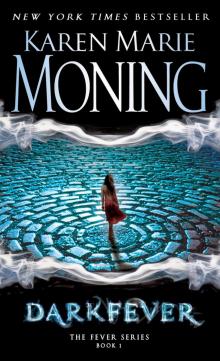 Darkfever
Darkfever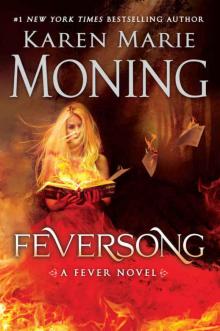 Feversong
Feversong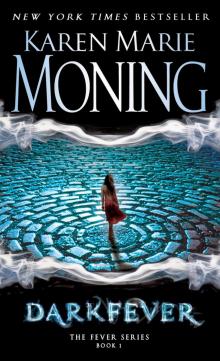 Faefever
Faefever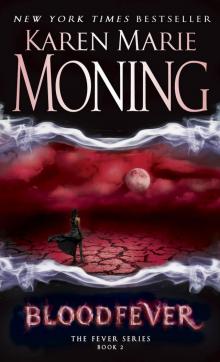 Bloodfever
Bloodfever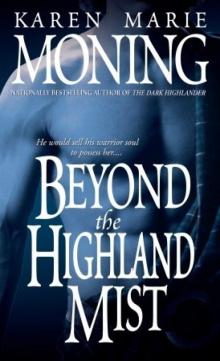 Beyond the Highland Mist
Beyond the Highland Mist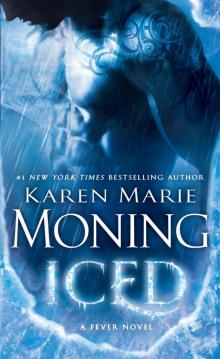 Iced
Iced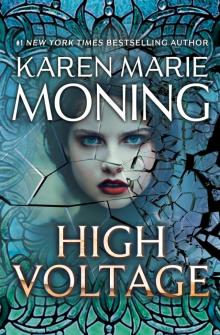 High Voltage
High Voltage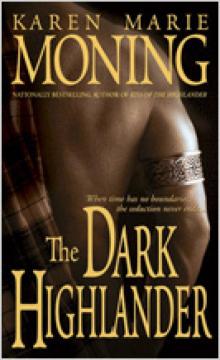 The Dark Highlander
The Dark Highlander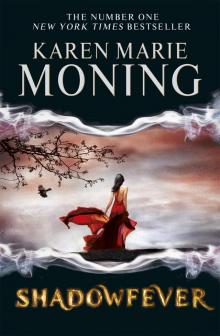 Shadowfever
Shadowfever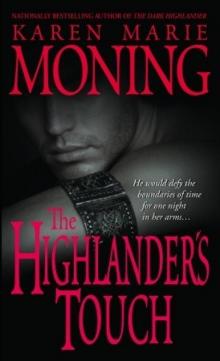 The Highlander's Touch
The Highlander's Touch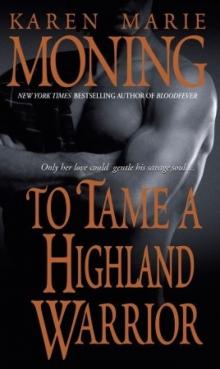 To Tame a Highland Warrior
To Tame a Highland Warrior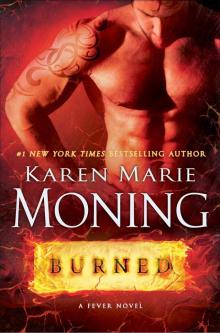 Burned
Burned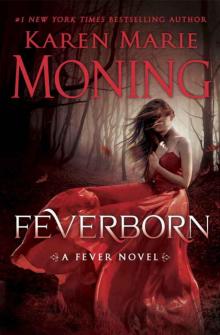 Feverborn
Feverborn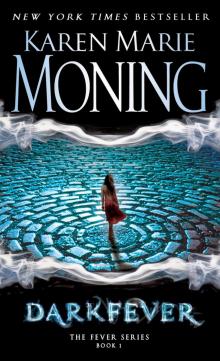 Dreamfever
Dreamfever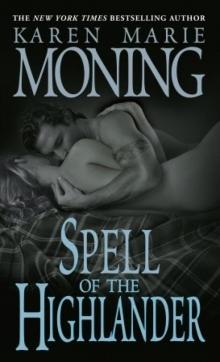 Spell of the Highlander
Spell of the Highlander Kiss of the Highlander
Kiss of the Highlander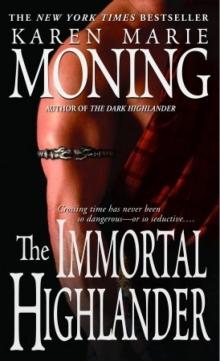 The Immortal Highlander
The Immortal Highlander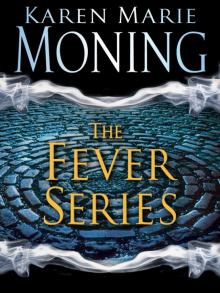 Karen Marie Moning’s Fever Series 5-Book Bundle: Darkfever, Bloodfever, Faefever, Dreamfever, Shadowfever
Karen Marie Moning’s Fever Series 5-Book Bundle: Darkfever, Bloodfever, Faefever, Dreamfever, Shadowfever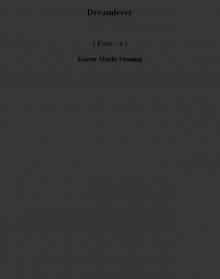 Dreamfever f-4
Dreamfever f-4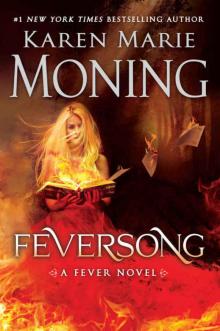 Feversong: A Fever Novel
Feversong: A Fever Novel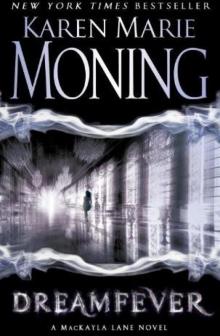 Dreamfever_The Fever Series
Dreamfever_The Fever Series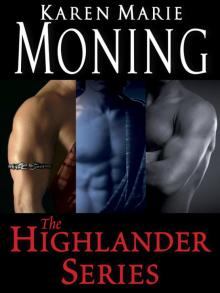 The Highlander Series 7-Book Bundle
The Highlander Series 7-Book Bundle![[Highlander 04] - Kiss of the Highlander Read online](http://i1.bookreadfree.com/i1/03/29/highlander_04_-_kiss_of_the_highlander_preview.jpg) [Highlander 04] - Kiss of the Highlander
[Highlander 04] - Kiss of the Highlander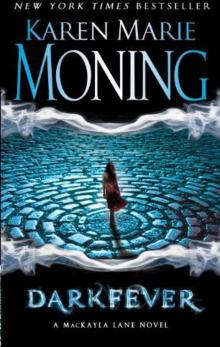 Darkfever_The Fever Series
Darkfever_The Fever Series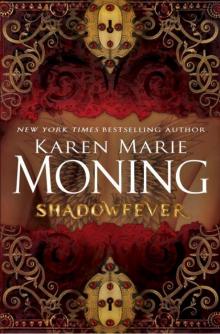 Shadowfever_Fever
Shadowfever_Fever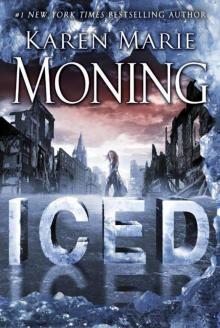 Iced: A Dani O'Malley Novel (Fever Series)
Iced: A Dani O'Malley Novel (Fever Series)![Fever [08] Feverborn Read online](http://i1.bookreadfree.com/i2/04/09/fever_08_feverborn_preview.jpg) Fever [08] Feverborn
Fever [08] Feverborn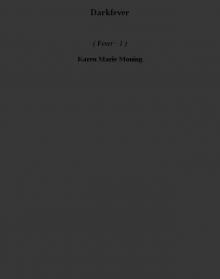 Darkfever f-1
Darkfever f-1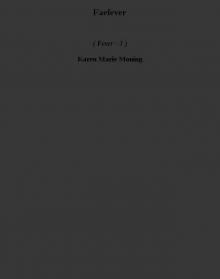 Faefever f-3
Faefever f-3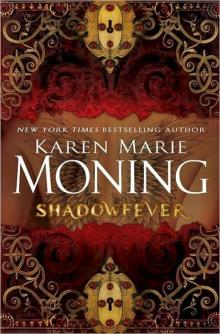 Shadowfever f-5
Shadowfever f-5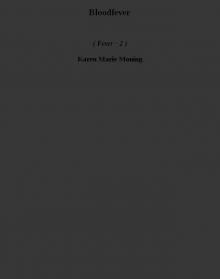 Bloodfever f-2
Bloodfever f-2